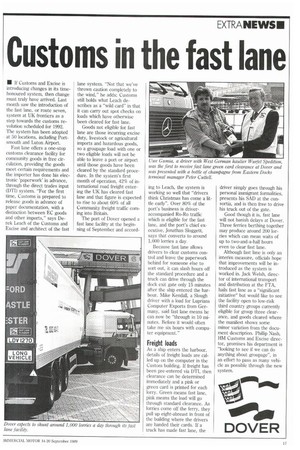Customs in the fast lane
Page 19

If you've noticed an error in this article please click here to report it so we can fix it.
• If Customs and Excise is introducing changes in its timehonoured system, then change must truly have arrived. Last month saw the introduction of the fast lane, or route seven, system at UK frontiers as a step towards the customs revolution scheduled for 1992. The system has been adopted at 50 locations, including Portsmouth and Luton Airport.
Fast lane offers a one-stop customs clearance facility for community goods in free circulation, providing the goods meet certain requirements and the importer has done his electronic 'paperwork' in advance, through the direct trades input (DTI) system. "For the first time, Customs is prepared to release goods in advance of paper documentation, with a distinction between EC goods and other imports," says Derek Leach of the Customs and Excise and architect of the fast lane system. "Not that we've thrown caution completely to the wind," he adds; Customs still holds what Leach describes as a "wild card" in that it can carry out spot checks on loads which have otherwise been cleared for fast lane.
Goods not eligible for fast lane are those incurring excise duty, livestock or agricultural imports and hazardous goods, so a groupage load with one or two eligible loads will not be able to leave a port or airport until those goods have been cleared by the standard procedure. In the system's first month of operation, 42% of international road freight entering the UK has cleared fast Lane and that figure is expected to rise to about 60% of all Community freight traffic coming into Britain.
The port of Dover opened a fast lane facility at the beginning of September and accord ing to Leach, the system is working so well that "drivers think Christmas has come a little early". Over 80% of the port's business is driveraccompanied Ro-Ro traffic which is eligible for the fast lane, and the port's chief executive, Jonathan Sloggett, says that converts to around 1,000 lorries a day.
Because fast lane allows drivers to clear customs control and leave the paperwork behind for someone else to sort out, it can slash hours off the standard procedure and a truck can drive through the dock exit gate only 15 minutes after the ship entered the harbour. Mike Kendall, a Slough driver with a load for Luprians Computer Exports from Germany, said fast lane means he can now be "through in 10 minutes. Before it would often take me six hours with computer equipment."
Freight loads
As a ship enters the harbour, details of freight loads are called up on the computer in the Custom building. if freight has been pre-entered via DTI, then clearance can be determined immediately and a pink or green card is printed for each lorry. Green means fast lane, pink means the load will go through standard clearance. As lorries come off the ferry, they pull up eight-abreast in front of the building where the drivers are handed their cards. If a truck has made fast lane, the driver simply goes through his personal immigrant formalities, presents his SAD at the consortia, and is then free to drive his truck out of the gate.
Good though it is, fast lane will not banish delays at Dover. Three ferries berthing together may produce around 200 lorries which can mean waits of up to two-and-a-half hours even to clear fast lane.
Although fast lane is only an interim measure, officials hope that improvements will be introduced as the system is worked in. Jack Welsh, director of international transport and distribution at the FTA, hails fast lane as a "significant initiative" but would like to see the facility open to low-risk third country groups currently eligible for group three clearance, and goods cleared where the manifest shows some minor variation from the document description. Phillip Nash, HM Customs and Excise director, promises his department is "looking to see if we can do anything about groupage", in an effort to pass as many vehicle as possible through the new system.






















































































































































